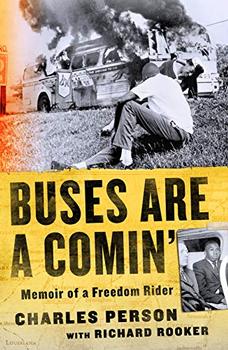Summary | Excerpt | Reading Guide | Reviews | Beyond the Book | Readalikes | Genres & Themes | Author Bio

Memoir of a Freedom Rider
by Charles Person, Richard Rooker
Once, instead of taking me to forested paths, Dad brought me to Stone Mountain, the enormous, bald bluff famous (and infamous today) for the giant sculpture of Confederate "heroes" Jefferson Davis, Robert E. Lee, and Stonewall Jackson. The front side of Stone Mountain looks like a giant, eight-hundred-foot-tall loaf of granite bread sitting on the flat ground around it. The back side is a stone quarry. Granite from the Stone Mountain quarry made the steps of the US Capitol and the locks of the Panama Canal. Cars in Washington, D.C., drive across bridges made of this Georgia stone, and guests staying at the Imperial Hotel in Japan reside inside it. Stone Mountain is famous for its granite.
It is also famous for the Ku Klux Klan. I've come to learn in my adult life that following D. W. Griffith's 1915 film, Birth of a Nation, the KKK rose from near extinction.3 It rose on Stone Mountain. There on Thanksgiving Eve 1915, a few handfuls of men burned a cross atop it.4 The next decades saw hoods and robes gather in increasing numbers at Stone Mountain's "Klan Shack" to reinforce their idea of the Southern way of life.5 They all looked the same in their getups, and they all had the same name: Jim Crow.
Dad knew Stone Mountain was a Ku Klux Klan location on the day he took me on a hike to the top, but he knew they operated there at night. I don't remember how old I was that day, but I know I had no idea what the Klan was.
It was an easy climb even though there was no path. We simply wandered up the hillside littered with stone-size bits of granite and downed tree trunks left behind as victims to the need for harvested rock. In some places, the cut chunks of granite were the size of steps. The closer we got to the top, the bigger the steps became until they turned into walls. Then we had to find a pathway between or around the walls. We made it to the top and didn't encounter the Klan. What we did encounter was a firepit, and I noticed lots of cigarette butts on the ground.
"Do people camp up here, Dad? Can we?"
Dad diverted my attention by making a strange observation. "The folks up here don't smoke my brand," I remember him telling me as if he were protecting me from people who didn't smoke Pall Malls. When I got older, I realized he was protecting me, but not from Marlboro or Salem or Camel smokers.
Visiting our relatives in the country was always fun. One weekend I remember us kids picking blackberries and peaches and ending up in the watermelon patch. Mom raided Great-Grandma's garden and picked tomatoes, green beans, collards, and sweet corn. The soil was so rich you could grow anything in that ground.
The kids fed the chickens and the pigs, and we played all day. There was no television in the country, so we went to bed early.
Sunday afternoon we left for home. We packed all the goodies Great-Grandma gave us along with the vegetables Mom had picked. That day, I watched in horror as my uncle wrung the necks of two chickens. They flopped around the yard till they died. When I saw that, I could not eat those chickens. I told Mom I wanted a chicken that came from the grocery store.
After the chickens were fried and the tea cakes were done, we loaded the car and headed back to Atlanta. I remember being tired and eager to get home.
When the sun went down that night, my dad saw something down the road that made him turn off the road we were on and head across the railroad tracks.
"Where are we going, Dad?" I asked. I wanted to get home.
Dad stopped the car in a neighborhood of shotgun houses. Like 21 Bradley, they had tin roofs, but these homes were built on stilts, not stacks of brick. We didn't know a soul, but porches were full of folks staring at the road from where we had just come.
"Kids, come here. Now."
Dad was not messing around, but I could not figure out why we were stopping at a home with people we did not know. They welcomed us and gave us their porch to share.
Excerpted from Buses Are a Comin' by Charles Person and Richard Rooker. Copyright © 2021 by Charles Person and Richard Rooker. Excerpted by permission of St. Martin's Press. All rights reserved. No part of this excerpt may be reproduced or reprinted without permission in writing from the publisher.




Polite conversation is rarely either.
Click Here to find out who said this, as well as discovering other famous literary quotes!
Your guide toexceptional books
BookBrowse seeks out and recommends the best in contemporary fiction and nonfiction—books that not only engage and entertain but also deepen our understanding of ourselves and the world around us.